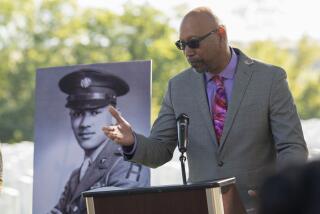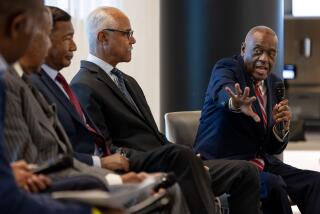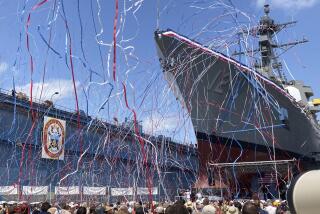Ernest Childers, 87; Native American Awarded Medal of Honor in WWII
- Share via
Ernest Childers, a Native American veteran who received the Medal of Honor while serving with the Army’s 45th Infantry Division in Italy during World War II, has died. He was 87.
Childers died March 17 at a hospice in Tulsa, Okla., after a series of strokes, his family said. He had lived in nearby Coweta.
“This extraordinary man was the very embodiment of courage under fire,” Oklahoma Gov. Brad Henry said in a statement. “His life was and is a true inspiration.”
A Muscogee (Creek) Indian from Broken Arrow, Okla., Childers was a second lieutenant when his division hit the beach at Salerno in early September 1943.
Despite fracturing his instep Sept. 22 in a shell crater amid the predawn darkness near Oliveto, Childers led eight of his men up a hill toward enemy machine gun nests. Ordering his men to give him covering fire, he continued advancing alone.
“Moving forward along the edge of the field under mortar and artillery shelling, he was fired upon by two German riflemen from a nearby house,” his Medal of Honor citation reads. “Returning the fire, Childers killed both. Continuing his advance, he moved behind an enemy machine gun nest and killed its two occupants with his carbine.
“He then made his way to a spot near the second nest and, using rocks as simulated grenades, caused the gunners to stand up. He killed one with his carbine, while the other German was accounted for by one of Childers’ men who had moved around to the left side of the field.”
The second lieutenant continued his advance up the hill and single-handedly captured a German mortar observer.
“Childers’ indomitable courage and coolness under fire from a determined enemy,” the citation reads, “enabled his battalion to continue its advance.”
In an interview with the Daily Oklahoman in 1994, he said: “Heroism was the furthest thing [from] my mind that day. I was just trying to stay alive and help keep my buddies alive.”
Childers, who was wounded at the Battle of Anzio, was recovering at a military hospital in Naples when he won the Medal of Honor, the highest military award for valor. He later met with President Roosevelt in Washington.
One of five brothers, Childers was born in 1918 and grew up on a farm that was his father’s original tribal allotment. The elder Childers, a Creek Nation lawyer, died when Ernest was in grade school.
Things were so difficult for the family during the Depression that Ernest’s mother not only couldn’t buy meat, she also could afford to give him just one .22-caliber cartridge a day to hunt a rabbit for dinner.
“I got to be a very good aim,” he told the Tulsa World in 2002. “Because if I missed, we didn’t eat.”
Childers, who attended the Chilocco Indian School, joined the Oklahoma National Guard in 1937. Called to active duty after Pearl Harbor, he remained in the Army after the war and retired in 1965 as a lieutenant colonel.
In 1994, a 9-foot statue of a uniformed Childers holding an Indian blanket was dedicated at Broken Arrow’s Veterans Park.
A middle school in Broken Arrow had been named for him a decade earlier. Until recent years, he was a fixture at the school’s annual yearbook parties.
On the day Childers died, students observed a moment of silence for the man who inspired the school’s motto: “A Tradition of Honor.”
He is survived by his wife of 59 years, Yolanda; daughters Elaine Childers of Tulsa and Donna Thirkell of Houston; a son, Ernie Childers of Augusta, Ga.; and a brother, Owen, of Tulsa.
More to Read
Sign up for Essential California
The most important California stories and recommendations in your inbox every morning.
You may occasionally receive promotional content from the Los Angeles Times.













